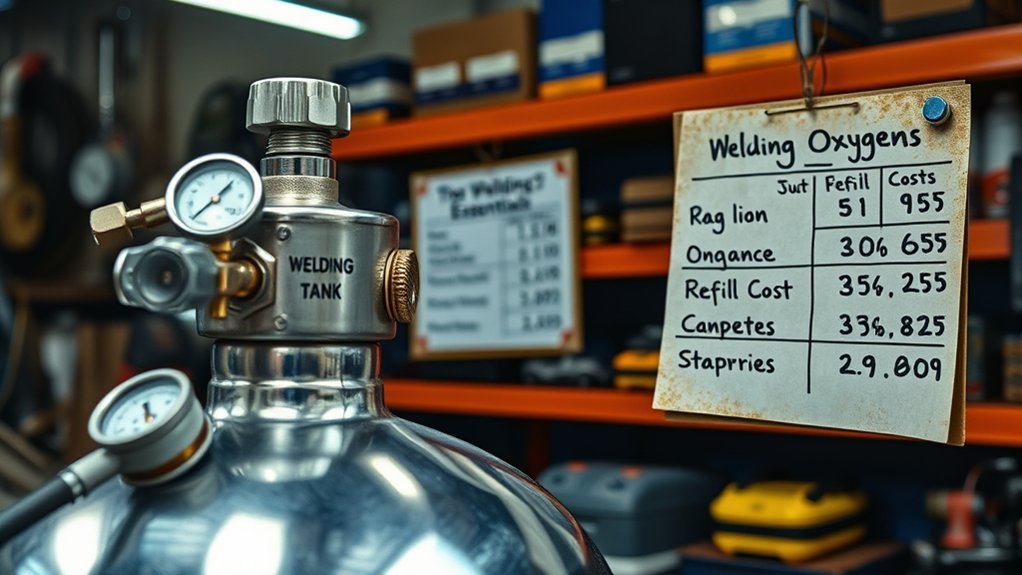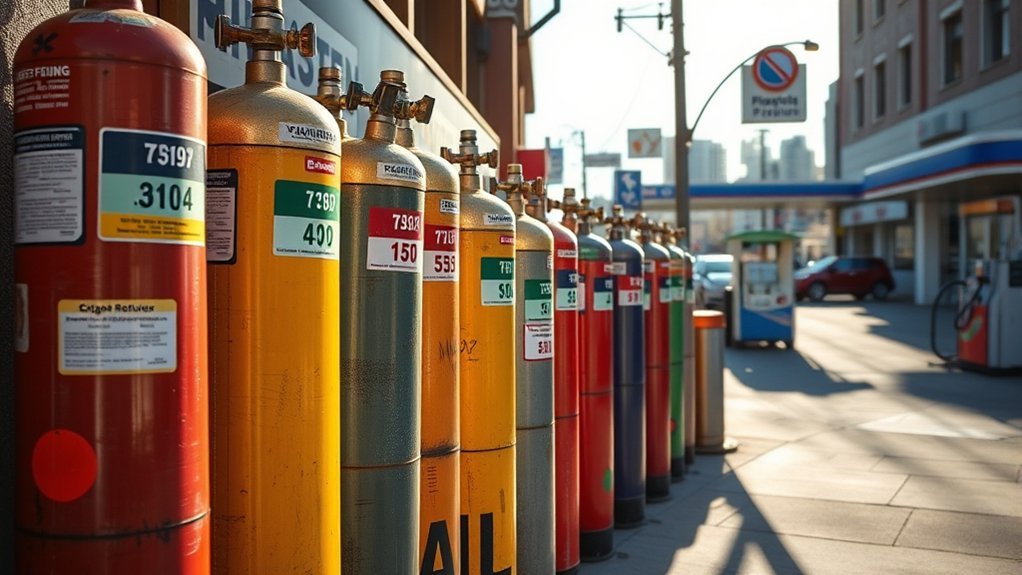Welding oxygen refill costs typically range from $15 to $100, depending on your tank size and local supplier. Smaller tanks, like 20 cu ft, can cost around $15, while larger tanks, such as 80 cu ft, generally cost between $40 and $70. Prices vary by provider and location, so it’s wise to shop around. Building strong relationships with suppliers might offer you discounts or even free refills. There’s more to reflect upon when it comes to optimizing your costs.
Understanding Welding Oxygen Costs

When you’re considering welding oxygen costs, it’s essential to understand the factors that influence pricing. The refill process varies considerably depending on tank size and your service provider.
For instance, a refill for a 40 CF welding oxygen tank generally costs around $60, while an 80 CF tank refill is about $70. However, prices can fluctuate based on location, with reports of small tank refills costing as little as $15 and some specialized locations charging up to $100.
Additionally, establishing good connections with local suppliers may lead to free or discounted refills. Overall, the cost of welding oxygen remains more stable compared to medical oxygen, making it a reliable choice for various applications.
Factors Influencing Refill Prices

When considering welding oxygen refill prices, tank size plays an essential role in determining costs.
Smaller tanks typically incur lower refill fees, while larger tanks can greatly increase your expenses.
Additionally, your supplier’s pricing strategies and any existing relationships can further impact what you ultimately pay.
Tank Size Variation
Various tank sizes considerably influence the cost of welding oxygen refills. When you consider tank size comparison, it’s essential to match your needs with the appropriate tank.
Smaller tanks, like the 20 cu ft cylinder, have refill prices around $15, while larger tanks, such as the 80 cu ft cylinder, can range from $40 to $70. The refill price for a 40 cu ft tank typically hovers around $60.
- Larger tanks often lead to less frequent refills.
- You may save on labor costs over time.
- Local supplier prices can vary widely.
- Efficient use of oxygen can prevent waste.
Understanding these factors helps you make informed decisions about your refill frequency and overall costs.
Provider Pricing Strategies
Understanding provider pricing strategies is essential for managing your welding oxygen refill costs effectively. Factors like tank size, demand, and local competition play significant roles in determining your refill price. Some providers offer discounts for loyal customers, which can make a noticeable difference in your expenses. Pricing transparency is crucial; knowing how much you’re paying and why can help you choose the best supplier.
| Tank Size | Average Cost | Provider Type |
|---|---|---|
| Small | $15 | Local welding shop |
| Medium | $40 | HVAC service |
| Large | $100 | Airport supplier |
| Extra Large | $150 | Medical supply outlet |
| Discounted | Varies | Loyal customer pricing |
Comparing Refill Costs Across Locations

How do refill costs for welding oxygen differ across various locations?
Refill price comparison reveals significant variation, with costs ranging from $2 to $150. For example, a refill at Phoenix-Mesa Gateway Airport might set you back around $50, while an FBO in Midland, TX charges nearly $100.
Local welding shops often provide competitive rates, with 20 cu ft R Type O2 refills averaging about $15. Your relationships with providers can impact costs as well, with some users scoring free refills.
Local welding shops typically offer competitive rates, with 20 cu ft R Type O2 refills averaging around $15.
- The frustration of overpaying
- The satisfaction of finding local deals
- The joy of strong customer connections
- The relief from knowing options exist
Understanding location impact can help you navigate these costs effectively.
Tips for Finding Affordable Refill Options

Are you tired of overpaying for welding oxygen refills? To find affordable options, start by comparing prices among local welding shops, HVAC services, and airport providers.
Costs can vary considerably, from as low as $2 to over $150. Building strong supplier relationships can lead to refill discounts—some users report free or greatly reduced refills through connections.
Consider investing in larger tanks; they often incur similar labor costs for refills, making them more economical in the long run. Additionally, using transfill kits allows you to refill larger bottles from smaller tanks, saving you money over time.
Don’t forget to check local distributors like General Distributing for competitive pricing and better refill deals.
The Importance of Cylinder Size in Cost

Choosing the right cylinder size is essential for controlling your welding oxygen costs. A thorough cost analysis reveals that larger cylinders often provide better cylinder efficiency, leading to lower long-term expenses.
Here are some key points to take into account:
- Smaller tanks require frequent refills, increasing overall costs.
- Larger cylinders, despite higher initial prices, can reduce refill frequency.
- For example, an 80 CF tank offers a more economical option at $70 per refill.
- Reflect on your welding frequency to select the most cost-effective size.
Personal Experiences With Welding Oxygen Refills
Many welders have shared their personal experiences with welding oxygen refills, highlighting the diverse range of costs and strategies that can influence expenses. Users often see refill costs between $15 and $100, depending on their location and supplier relationships. Networking within the welding community can lead to free refills, promoting welding safety and ensuring oxygen purity.
| Tank Size | Typical Cost | Notable Locations |
|---|---|---|
| 20 cu ft | $15 | Local suppliers |
| 40 cu ft | $30-$50 | Phoenix-Mesa Gateway |
| 80 cu ft | $50-$80 | Phoenix International Airport |
| Custom Kit | Variable | Personal setups |
| Negotiated | Free | Trusted suppliers |
Implementing personal setups with larger tanks and transfill kits can greatly reduce costs for frequent users.
Frequently Asked Questions
How Often Do I Need to Refill My Welding Oxygen Cylinder?
You’ll need to refill your welding oxygen cylinder based on your welding frequency and cylinder size. Typically, larger cylinders last longer, so monitor your usage closely to determine when it’s time for a refill.
Can I Exchange My Empty Cylinder for a Full One?
Yes, you can exchange your empty cylinder for a full one at most welding supplies stores. Verify your cylinder meets safety standards, as this process streamlines your work and maintains efficiency in your welding projects.
Are There Any Safety Precautions for Storing Welding Oxygen?
When storing oxygen, follow safety guidelines: keep cylinders upright, in a cool area, away from flammable materials, and guarantee proper ventilation. Regularly inspect for leaks and maintain clear access to the storage location.
What Types of Welding Require Oxygen Refills?
For gas welding processes like oxy-acetylene welding, you’ll need oxygen refills. This method combines oxygen types to achieve high temperatures, essential for tasks like joining metal parts in automotive repairs or artistic metal sculptures.
Is Welding Oxygen the Same as Medical Oxygen?
No, welding oxygen isn’t the same as medical oxygen. Welding processes require higher oxygen purity to prevent impurities, while medical oxygen is regulated for patient safety, ensuring specific standards for health use.
Conclusion
In conclusion, understanding the cost of welding oxygen refills is essential for budget-conscious welders. On average, you might pay around $20 to $40 for a standard refill, but prices can vary greatly based on location and cylinder size. Notably, a 2018 industry report indicated that 65% of welders consider refill costs when choosing their suppliers. By being aware of these factors and utilizing tips for affordability, you can optimize your welding expenses effectively.


